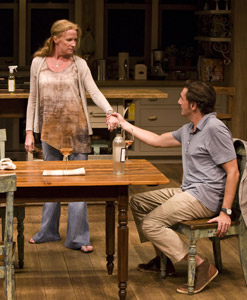HOME PAGE
SITE GUIDE
SEARCH
ADVERTISING AT CURTAINUP
REVIEWS
FEATURES
NEWS
Etcetera and
Short Term Listings
LISTINGS
Broadway
Off-Broadway
NYC Restaurants
BOOKS and CDs
OTHER PLACES
Berkshires
London
California
New Jersey
Philadelphia
Elsewhere
QUOTES
TKTS
PLAYWRIGHTS' ALBUMS
LETTERS TO EDITOR
FILM
LINKS
MISCELLANEOUS
Free Updates
Masthead
Writing for Us
A CurtainUp Los Angeles Review
Poor Behavior
|
Ian, did you do this? Did you plan it? Did you deliberately destroy our lives?— Ella Would that be a good thing, or a bad thing?” — Ian |

Johanna Day and Reg Rogers
in Poor Behavior
(Photo:Craig Schwartz) |
We arrive in the middle of a drunken word fight between Ian (Reg Rogers), a verbose Englishman, and Ella (Johanna Day), who starts out lambasting him for criticizing Americans. Their spouses, who can’t get a word in, are beautiful Maureen (Sharon Lawrence), who spends most of her on-stage time weeping loudly and Peter (Christopher Evan Welch), bland and boring.
We’re not sure who instigated the weekend but, as the play goes on, suspicion falls on Ian. He seems to have the most to gain. As Maureen weeps and Peter interjects meaningless non-sequiturs, Ian zeros in on Ella, circling her like an Apache around an endangered wagon train. Ella, bored as she is in her marriage to boring Peter, is reluctant to get out of it.
When they return from grocery shopping late Saturday afternoon, Ian is still at it. Poor Peter takes it out on a hapless bunch of basil.
And so it goes, down to the bitter sad funny end, which end on the note quoted above. When Ella asks, “Did you deliberately destroy our lives?” Ian answers her question with a question —, “Would that be a good thing, or a bad thing?”
Out of destruction, a new life or new marriage could begin. Or not. He seems genuinely confused.
The author says in the program notes that the play asks a lot of questions about marriage, questioning its durability as an institution. One actor said maybe its just in one of those arid spells that married couples get over if they have a chance. Maybe that’s why there are bonds of marriage that are reinforced by church and state and the legal system to make them a little harder to break, to give people time to mull.
That’s why the insane laughter, high-pitched and sardonic. That’s why we laugh along with it, laughing at ourselves and with ourselves.
John Lee Beatty has done a superb job on the cozy cottage that’s the embodiment of home. Ben Stanton’s lighting design reinforces it, from twilight to midnight to morning. Doug Hughes directs with his finger on the pulse of the rollicking pace of the play that never lets up. This is sustained by Reg Rogers as Ian. His tumbling lines run over each other, as Ian is a character that never stops talking. He’s always on. Despite a desperate need to get out of his marriage, he seems to be excusing himself, much like the state of marriage in this country. He finally persuades Ella to come along.
Johanna Day makes a practical Ella, a far cry from the weeping Maureen. She’s wary of Ian, despite the attraction. Maureen, the pretty girl with nothing else to offer who succumbs to weeping, is given more life than she deserves by Sharon Lawrence. And, in one of the play’s best performances, Christopher Evan Welch holds the stage every chance he gets, losing no chance for humor or individuality.
Even though Ella feels Ian has destroyed their lives, she, like Ian and the play itself, poses a tormenting question: can marriage survive and, if it does, is the flame worth the candle?
|
Poor Behavior Playwright: Theresa Rebeck Director: Doug Hughes Cast: Ian (Reg Rogers), Ella (Johanna Day), Maureen (Sharon Lawrence), Peter (Christopher Evan Welch). Scenic Design: John Lee Beatthy Costume Design: Catherine Zuber Lighting Design: Ben Stanton Original Music and Sound Design: David Van Tieghem When: September 18, 2011-October 16, 2011. Where: Mark Taper Forum, 135 N. Grand Ave., Los Angeles. Reservationsl (213) 972-7231. Reviewed by Laura Hitchcock on Sept. 18. |
|
Subscribe to our FREE email updates with a note from editor Elyse Sommer about additions to the website -- with main page hot links to the latest features posted at our numerous locations. To subscribe,
E-mail:  esommer@curtainup.comesommer@curtainup.com esommer@curtainup.comesommer@curtainup.comput SUBSCRIBE CURTAINUP EMAIL UPDATE in the subject line and your full name and email address in the body of the message -- if you can spare a minute, tell us how you came to CurtainUp and from what part of the country. Visit Curtainup's Blog Annex For a feed to reviews and features as they are posted add http://curtainupnewlinks.blogspot.com to your reader Curtainup at Facebook . . . Curtainup at Twitter REVIEW FEEDBACK Highlight one of the responses below and click "copy" or"CTRL+C"
Paste the highlighted text into the subject line (CTRL+ V): Feel free to add detailed comments in the body of the email. . .also the names and emails of any friends to whom you'd like us to forward a copy of this review. |



